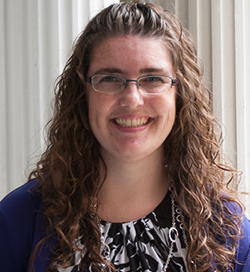In this regular feature, we hear from women academics and professionals about their lives, their faith, and the way it all intersects. Pull up a chair and join us as we chat with chemist and professor Jennifer Hawk.
Welcome, Jennifer! Tell us about yourself.
 Name: Jennifer Hawk
Name: Jennifer Hawk
Current position: Assistant Professor of Chemistry
Current location: Converse College in Spartanburg, South Carolina
Schools attended: BS at Hillsdale College, PhD at Duke University
Bonus Info: I was a part of InterVarsity chapters at both Hillsdale and Duke and now participate as a faculty member — I even got one of the ESN Grants that funds my research right now.
Favorite sports team: Duke Basketball
Favorite Craft: Knitting
What was the hardest part of grad school and what kept you sane?
When I was a fifth year PhD student, I got diagnosed with a really bad case of Ulcerative Colitis (UC). It hit me hard physically and I was very sick that year. I couldn’t work on my research and I could barely function as a human. As a result, I took a medical leave of absence from grad school and ended up having two major surgeries. During that time, I had lots of doubts, both about God and about my future. I felt like I had been called to be a professor, but how was that going to happen if I couldn’t finish grad school? I also had lots of financial stress during that time. I wasn’t getting paid from my grad stipend and I was racking up medical bills like crazy.
I know it’s cliché to say this, but my community (both inside and outside of school) really kept me sane and got me through that rough time period. I had friends taking me to colonoscopies, people from church paying my utility bills, ladies from church cooking for me, and roommates that supported me through everything and picked up the slack when I was sick.
I would also say that my community kept me sane during the “regular” parts of grad school as well. It was important for me to get out of lab and think about or do something other than chemistry. I had a running buddy who supported my fitness goals. I had intermural sports teams to help me get out of lab some. I also had various Christian groups (both from church and InterVarsity) that encouraged me spiritually.
What do you love most about your job right now?
Hands down, I love my students the most. I currently teach at a women’s college, and I love the fact that I get to teach, mentor, and encourage young women to grow and learn. I love the fact that some of my students attend the same church as me and I get to see them grow spiritually as well. I try to have groups of students over to my house for various events and meals throughout the year and especially love hosting bonfires with them.
How does your faith inform the way you think about or do your work?
I’d like to answer this question within the frame work of the three main areas of academic work: 1) teaching, 2) research, and 3) service.
- In my teaching, I try to remember the concept of grace and try to extend grace to students in various situations. I know that as a Christian, my merit and worth is NOT linked to my academic ability or anything I do or don’t do. And I try to remember that when I’m dealing with my students. Sometimes I’m better at that than at other times. I also often think about the balance of extending grace and holding students accountable. I try to find the balance. If I give them too much grace (deadlines, exams, etc.), then that’s not serving them well, but there is room for grace, even when sometimes the human side of me doesn’t think they deserve it.
- In my research, I try to remember something I heard in InterVarsity at Duke while in grad school. If I really believe God created everything, and that he gave me the intellect and inquisitive mind to learn, and create, and design new materials, then shouldn’t I ask him to help me unravel this mystery that is my research? If he is the ultimate creator and I’m created in his image to reflect some of that “creator-ness,” then shouldn’t I ask him for help in creating new materials and finding new uses for current chemicals?
- In my service to the college, I try to remember to actually be a servant. In academia, we often have to serve on various committees around campus. Most people find this an added burden and it can be tempting to have a bad attitude. I try to remember that this is an opportunity to actually SERVE my colleagues, my students, and the greater college community. When I’m particularly frustrated with how a meeting went or how a colleague responded, I try to remind myself to reorient my personal priorities and see if there is a better way to serve the community.